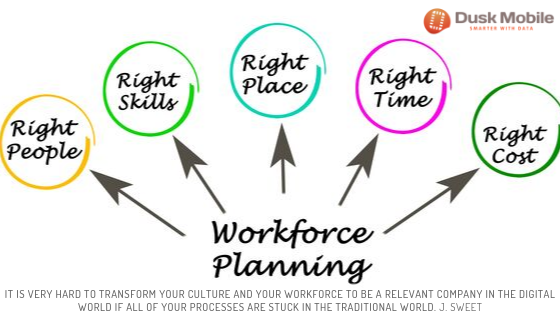
3 areas to explore for maximising outputs of distributed workforces
Today more than ever before, your teams can work anywhere, anytime and on any device. To maximise the output of your distributed workforce, some roles lend themselves better than others to optimization through technology. Skills based roles that are time boxed are a good foundation from which to build on but how do you get started?
To build that foundation really needs a technology solution, however Field Technologies Online reports that 52% of companies are still using manual methods to handle field service.
We cover technology solutions in another post and advocate the bringing together of teams and processes through a collaborative work management platform. Once a technology solution has been selected, maximizing the output of your distributed workforce is made much easier.
A technology solution provides a clear view of work, that opens the door to smarter forecasting, optimisation across work volumes, resources plus work activities. The latter optimisation areas are a topic being discussed regularly across our customers.
Getting started though should begin with forecasting, keeping reactive work to a minimum based on your industry and accepting that there is a margin of error that needs to be fine-tuned each day.
Work Volumes
Your business may have planned or unplanned work and even if 99% of your work is planned work, the inevitable will happen at some stage likely creating a peak in workload rather than a trough. This could be a dependent party, ad hoc contract awarded, third party asset failure or the weather to name a few unpredictable types. A trough such as a loss of contract or gap between projects is also a possibility.
Most work distributed to workforces has at least one service level attached to it, typically more. These baseline metrics need to be captured in your software platform to underpin the optimization.
So how can this be improved in your business?
The first place to start should be historical data that can help with a forecast to deliver a base level schedule. Within this data could be seasonal knowledge such as weather likelihoods or weather exclusion periods, equipment cycles for inspection/audit, perhaps known events also.
Ahead of setting this base schedule, cleansing should take place to reflect increases or decreases in work volumes. This change could have come about through winning of new work, increased requirements year on year for inspection or the loss of a key contract. Consider applying a multiplier here if required to accommodate the variance, which helps set a more realistic baseline.
Resources
The next part is the availability of resources to service the work volumes. There are planned and unplanned components to resourcing also. Training and planned leave are easier to input to a schedule along with shifts but there will always be sickness and also the length of the sickness that are unplanned. To accommodate this the ability to modify the schedule on the day becomes imperative but it should be the exception rather than the norm.
An area known as “truck rolls”, typically found more in B2C industries, represents a significant cost to both your business and your customer. Creating overall efficiencies and targeting cost reduction along with service quality improvements are vital to running your business smarter. Reducing truck rolls should be targeted with a view to maximizing the output of your distributed workforce. Sample costs to your business include unnecessary visits to your customer, for issues that could have been resolved remotely or scheduled maintenance that could be better planned based on existing data.
Adding to this, your customers are inconvenienced with time off work along with the product or service unavailability. Ultimately this can lead to customers voting with their feet and leaving your business, especially if the onsite visit is delayed or results in an even worse experience.
So how can this be improved in your business?
An area that some of our customers have trialled and implemented is cross skilling for work. Here is a real example we have worked with:
Example 1 – The organisation has multiple business units undertaking different work activities. A work type requires a specific skillset for unplanned work, which is the same skillset as a different business unit also uses for their unplanned work.
In a weather scenario, the unplanned business unit would be called out to the work activity but it would be same weather scenario that is causing the planned work to halt temporarily. There is someone located in very close proximity with the required skills and tools to undertake the unplanned work delivering multiple benefits.
Areas like this are where a collaborative work management platform come into their own. Providing visibility across teams into work volumes and work types to achieve operational excellence. This leads us into the next section on work activities for further optimization beyond your work volumes.
Work Activities
The factors for work activity optimization vary across our customer base by priority, geography, work type, skill set, cost, asset type and a few others.
The challenge arises when you look to maximise output of your teams based on one or more work activity factors. For example, you have work activities in a specific geography that require a skillset, equipment type and priority. Each of these carry a weighting of their own and perhaps skillset is the most important, followed by job priority then geography.
So how can this be improved for your business?
Example 2 – A Dusk Mobile customer has many different work types that we know as long cycle and short cycle. We have been working closely with them in the planned works area to look at the availability of short cycle work to sit around the long cycle work.
The engagement is going well and establishing the governance and underlying data sets has yielded clearly demonstrated benefits, which we hope to further build upon.
Can the Uberisation model intersect with longer duration project work in an environment of safety, multiple skills and constraints? We feel it can within an appropriate framework to deliver benefits across the business and customers while being compliant. Ensuring the right controls are in place to optimise this. Optimization engines is another topic and a key feature in our Intelligent Operations Platform for work planning and scheduling.
References
Takeaway Tip
So how do you get started? Speak to the team at Dusk about our experience in delivering work planning and dispatch solutions to our customers. Using drag and drop functionality, design and build your baseline quickly leading to improved productivity for your workforce. Connect to your existing systems to create an all of work view that can be shared between all authorised parties.
The Dusk Mobile Intelligent Operations Platform is an industry leading collaborative work management platform. It connects your staff on any device, any time and in any location. Integrate your favourite products quickly and easily for real time collaboration amongst your teams. Automating work functions and delivering a connected experience has never been easier and achieving productivity improvements can start tomorrow.
If you’d like to find out more on visibility, consistent messaging, workflows, automation with project management and easy integration for your teams or business, get in touch today with our friendly team.
Any questions: Our community is here to help in the Support & Updates area!
Try a 30 day free trial of our Intelligent Operations Platform and start seeing the benefits of automated workflows, informed decision making and a single, comprehensive view of your business in real time. Start collaborating today.
Start your free trial today
Not sure where to start? Request a demo from our team via the link:
Request a Demo
Or you just have some questions:


